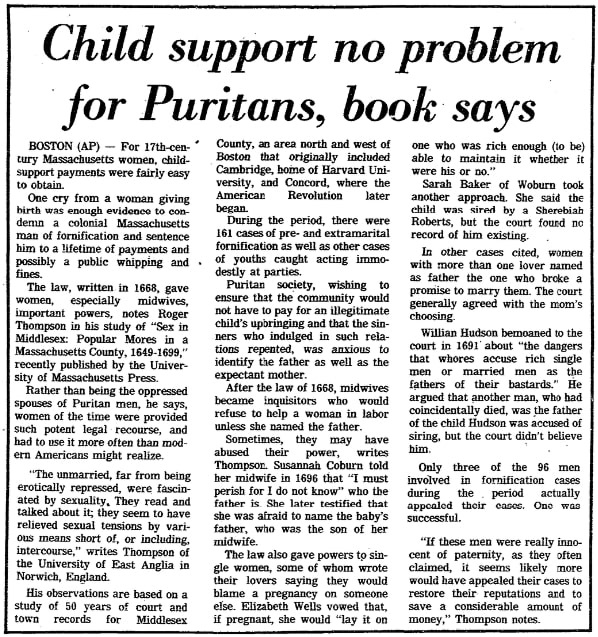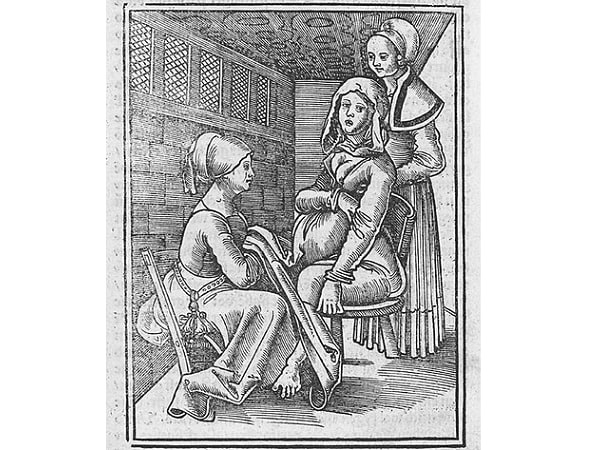Introduction: In this article, Melissa Davenport Berry continues her story about another aspect of Puritan life in the 17th century Massachusetts Bay Colony. Melissa is a genealogist who has a blog, AnceStory Archives, and a Facebook group, New England Family Genealogy and History.
In my article yesterday I introduced the paternity case of Susannah Colburn v. John Varnum. The detailed court documents are cited in Roger Thompson book’s Sex in Middlesex: Popular Mores in a Massachusetts County, 1649-1699 (many of the details in this article come from his book, as well as the following newspaper article).

Susannah was charged with fornication and brought into court. Usually, a woman who professed the name of the father to her midwife would have a legal advantage to collect financial support.
However, in this case Susannah was hesitant to reveal the identity of the father because he was John Varnum, the son of her midwife Sarah (Langton) Varnum.
Complicating matters, Susannah was residing in the home of her midwife Sarah, Sarah’s husband Samuel, and the father of her child – John. The Varnum family circled the wagons and took on several lines of defense against Susannah, which Thompson in his book asserted: “opened the floodgates to torrid circumstantial evidence.”
Susannah told the court: “It gave me great pains being in the house of goodman [Samuel] Varnum.”
It appears that after much persuasion, she confided in Samuel Varnum’s daughter Hannah (Susannah’s aunt through marriage to her uncle Ezra Colburn), who then questioned John – but he denied being the father. Susannah further testified that she was threatened by John’s brother, Joseph Varnum.
Several alternative males were nominated to be the one responsible for child support payments. Most were served up by the Varnum brothers.
Joseph reported that Samuel Fuller “was very intimate in the spring [of 1695] with Susannah and both were absent from prayer with family.”
According to a female witness, five weeks after her delivery (Susannah gave birth to her baby boy in January 1696), “she [Susannah] would give me twenty shillings if I would fetch the rogue Fuller to her, for she would make him to maintain the child.”
Next, the Varnum brothers offered up Richard Graves, a noted Casanova who openly admitted to having carnal knowledge of local girls, but denied he fathered any children.
The Varnum boys reported that in early May 1695 Susannah “was gone from her master’s house a considerable time to the other garrison.” When she returned, they pointed out there was no bed for her there, and asked where she had slept. She supposedly answered “with Graves.” Two women testified that they remembered “Susannah receiving blows on her belly,” and she then allegedly said “Have care, you will kill a young Graves.”
It was also suggested that Susannah could have got with child by any of the 10 soldiers who were garrisoned at Dracut. She was forbidden to visit them, and had been reproved for doing so by her master, Samuel Varnum.
Another scenario brought before the court by four witnesses was that Susannah made advances toward John, which he rejected. As one witness claimed: “Her naming of John Varnum was her revenge of unrequited passion.” Another witness claimed: “She would sware that she would be revenged of him [John].”
Susannah did not stand a chance against the Varnum clan and their supporters. She had little friends or support. Her failure to name the father at the time of birth was her downfall, and on 23 June 1696 the court “considering the circumstance and pleas made, dismissed John Varnum of all costs.” Susannah was convicted of fornication, with a penalty of either a 40-shillings fine or 10 lashes of the whip.
John Varnum married Dorothy Prescott in 1700 and had several children. There is no further documentation on what happened to Susannah or her child, which she chose to name John.
Related Article:
